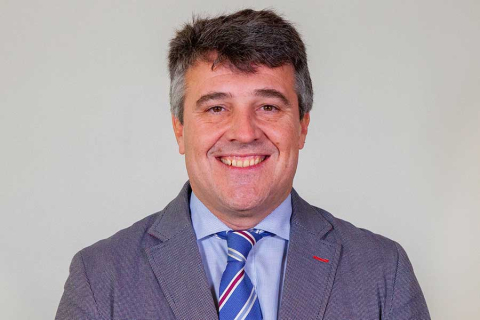This was another lecture organized by the MUW Doctoral School as part of the STER program - Internationalization of Doctoral Schools by NAWA. Prof. David Herrera was invited by Prof. Paweł Włodarski, Vice Rector for International Relations, Development and Promotion.
The Vice Rector introduced the guest's profile. Prof. David Herrera is a Vice Dean of the Faculty of Odontology UCM. He served as president of the Spanish Society of Periodontology from 2013-2016. From 2020 to 2021 he was a chairman of the Periodontal Research Group of the International Association for Dental Research, and from 2016 to 2022 he was a member of the FDI Global Periodontal Health Project working group. He has authored more than 180 scientific publications in JCR journals.
- You will be able to see how Professor Herrera's work translates into modern medicine during his lecture - said Professor Paweł Włodarski.
About the links between diseases
To make the audience aware of the essence of the lecture - research that establishes a link between diseases, Prof. Herrera used an example from his specialty.
- The most common periodontal diseases are gingivitis and periodontitis. If we consider all types of periodontitis - not just the acute one - between 40 and 50% of the adult population in Western countries suffers from it - said Prof. Herrera.
The consequences of the disease include receding and bleeding gums, dentin hypersensitivity and tooth loss. The disease also reduces the quality of life. But more than that - it also affects the entire body, as the bacteria that cause it enter the bloodstream, which, combined with other factors, can lead to increased systemic inflammation.
- When there is increased inflammation in the body, there is a higher risk of various diseases, including very serious ones: diabetes or cardiovascular diseases - Prof. Herrera stressed.
What you could learn during the lecture
Professor Herrera outlined concepts relevant to establishing a relationship between diseases. Referring to the audience's knowledge, the speaker reminded the audience that the goal of any study is to establish a casual relationship between two or more outcomes. The key with research is to have a good understanding and distinction of what is an outcome, what is an effect, and what is a variable.
- The variable is what I measure it with. The result is how I measure it, while the end result is what I want to achieve - explained Professor Herrera.
The speaker then discussed the relationship between periodontal disease and systemic diseases, biological plausibility, epidemiological studies, and intervention studies. He pointed out that with the scientific evidence of the relationship between diseases, the next step should be a discussion with experts and the development of an appropriate consensus and management protocol. So that all of this scientific work can positively benefit the patient.
- Efficiency alone is not enough to be able to make appropriate recommendations - Professor Herrera pointed out.
The lecture was aimed at students of doctoral studies conducted at our university, as well as all those interested in this topic.
Bidding farewell to the audience, Prof. David Herrera said:
- I hope that the topics I discussed were of interest to you and will help you prepare your dissertation, as well as help prepare you to participate in a very important area, which is research.
